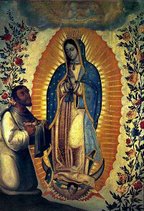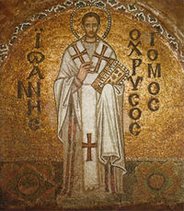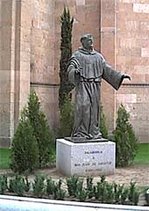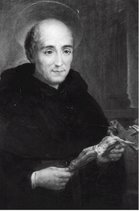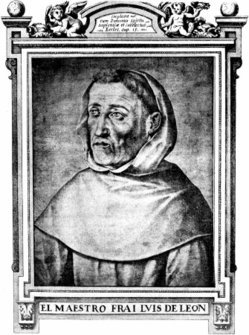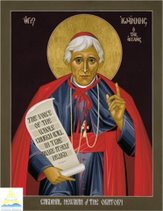
Giacomo Leopardi is a famous Italian poet from the Romantic era and just about the most famous man of letters from the Italian Marches (Le Marche) a region of Italy near the Adriatic once belonging to the Papal States. I lived there during the summer of 1998 in the little city of Urbino. Leopardi's poetry is haunting yet beautiful. In general his view of life was pretty bleak and influenced the thought of his contemporary the philosopher Schopenhauer. I have personally read through his notebooks (Zilbadone) where he jotted down his thoughts on life the universe and everything. Most significantly, he is probably one of the first people before Nietzsche to make concrete arguments against the Neo-Platonic view of God. (So while Nietzsche may have though he was disproving the Judeo-Christian God but this is what he was really rallying against when taken in the history of philosophy as a whole.) Incidentally, Leopardi also died the same year as Pushkin. Though while Pushkin was stupid enough to get in a duel Leopardi always was sickly on account of chronic tuberculosis and died in the Southern Italy near Naples where he had gone to alleviate his symptoms.
To His Lady
Sweet beauty that inspires me with love from afar
Hiding your face except in dreams when a divine shadow envelopes me
Or in the country where you shine brighter than the sun and Nature’s laughter
Perhaps you graced the fortunate Age that they call Golden
Oh spirit, maybe now you fly about among people
Or cruel fate, which hides you, is preparing you for future generations.
I don’t hope to see you in this life,
If not until, naked and alone, my spirit will walk down a new path
Toward a peculiar room.
At the opening of my foggy and uncertain day
I though you’d be my fellow traveller on this arid soil.
There’s nothing on earth that resembles you,
And if there were an equal as for your face, actions and speech
Even if identical she would be that less beautiful.
Among so much pain that fate has decreed for human life
If you’re truly as my thought paints you
Whoever should love you on earth, at least his life could be called blessed.
I see clearly now how your love
Will make me keep on with praises and virtue as in the days of my youth.
Since heaven gives no comfort to my cares
For mortal life with you would be like life eternal.
In the valley where the song of the tired farmer resounds
I sit down and lament the error of my youth that now abandons me.
In which I remember and cry over my lost desires and life’s wasted hope.
Thinking of you awakens the beating of my heart,
If only I could preserve Ideal Beauty in this fallen world
I would be glad of your image being taken from me
If it were one of the eternal ideas, that the eternal center disdains
To see dressed under a sensible form
or attempt the trials of a funerary life among fallen ruins.
Perchance if another Earth welcomes you high up in the orbits of infinite worlds
And a sun more beautiful than our neighboring star shines upon you
And you breathe gentler air.
From hence where the years are unlucky and short
receive this hymn from a lover unknown.
ALLA SUA DONNA
Cara beltà che amore
Lunge m'inspiri o nascondendo il viso,
Fuor se nel sonno il core
Ombra diva mi scuoti,
O ne' campi ove splenda
Più vago il giorno e di natura il riso;
Forse tu l'innocente
Secol beasti che dall'oro ha nome,
Or leve intra la gente
Anima voli? o te la sorte avara
Ch'a noi t'asconde, agli avvenir prepara?
Viva mirarti omai
Nulla spene m'avanza;
S'allor non fosse, allor che ignudo e solo
Per novo calle a peregrina stanza
Verrà lo spirto mio. Già sul novello
Aprir di mia giornata incerta e bruna,
Te viatrice in questo arido suolo
Io mi pensai. Ma non è cosa in terra
Che ti somigli; e s'anco pari alcuna
Ti fosse al volto, agli atti, alla favella,
Saria, così conforme, assai men bella.
Fra cotanto dolore
Quanto all'umana età propose il fato,
Se vera e quale il mio pensier ti pinge,
Alcun t'amasse in terra, a lui pur fora
Questo viver beato:
E ben chiaro vegg'io siccome ancora
Seguir loda e virtù qual ne' prim'anni
L'amor tuo mi farebbe. Or non aggiunse
Il ciel nullo conforto ai nostri affanni;
E teco la mortal vita saria
Simile a quella che nel cielo india.
Per le valli, ove suona
Del faticoso agricoltore il canto,
Ed io seggo e mi lagno
Del giovanile error che m'abbandona;
E per li poggi, ov'io rimembro e piagno
I perduti desiri, e la perduta
Speme de' giorni miei; di te pensando,
A palpitar mi sveglio. E potess'io,
Nel secol tetro e in questo aer nefando,
L'alta specie serbar; che dell'imago,
Poi che del ver m'è tolto, assai m'appago.
Se dell'eterne idee
L'una sei tu, cui di sensibil forma
Sdegni l'eterno senno esser vestita,
E fra caduche spoglie
Provar gli affanni di funerea vita;
O s'altra terra ne' supremi giri
Fra' mondi innumerabili t'accoglie,
E più vaga del Sol prossima stella
T'irraggia, e più benigno etere spiri;
Di qua dove son gli anni infausti e brevi,
Questo d'ignoto amante inno ricevi.
A su dama
Querida belleza que de amor me inspiras desde lejos,
O escondiendo la cara si no en sueños
Una divina sombra me embiste
O en los campos donde brillaba
Más bello el sol del día y la risa de la naturaleza
Quizás tú inocente, bendijiste la edad dichosa que llaman de oro
Alma, ahora vuelas ligera entra la gente
O la suerte esquiva que te nos esconde te prepara para los que han de venir
No tengo esperanza ya de mirarte con vida
Si no fuera entonces, cuando desnudo y solo
Mi espíritu paseará por una calle nueva hacia una habitación peregrina
Ya, al abrirse mi jornada incierta y nebulosa
Te pensé ser compañera de viaje en este árido suelo
No hay nada en tierra que te asemeje
Y si par hubiera en cuanto a la cara, las acciones, y el habla
Aunque conforme sería mucho menos bella.
Entre tanto dolor que el hado propuso para la edad humana
Si de verdad eres como te pintó mi pensamiento
A quienquiera que te amase en tierra le sería dichoso al menos este vivir.
Y ahora veo muy claro como tu amor me haría seguir con alabanzas y virtud cual en los años de juventud.
Ahora el cielo no añade ningún consuelo a nuestros afanes
Y contigo la vida mortal sería como aquella eterna allá en el cielo.
Por el valle donde suena el canto del fatigado granjero
me siento y lamento el error juvenil que me abandona
En que recuerdo y lloro los deseos perdidos y la esperanza marchita de mis días
pensando en tí me despierta el palpitar del corazón
y si yo pudiera conservar la belleza ideal en este mundo caduco
mucho me pagaría de la imagen que se me quitase de la vista,
Si eres una de las eternas ideas
Que el seno eterno desdeña ver vestida de forma sensible
o en despojos caducos probar los afanes de una vida funeraria
O si acaso otra tierra te acoge en las altas órbitas entre mundos sin número
Y te brilla un sol más bello que nuestra próxima estrella
Y respiras éter más benigno
Desde acá donde los años son breves e infaustos
Recibe este himno de un amante desconocido.




 "Where are the canisters, Achmed? Where are the Canisters?
"Where are the canisters, Achmed? Where are the Canisters?  Dammit Achmed, we're running out of time. Where are the canisters?
Dammit Achmed, we're running out of time. Where are the canisters?  Ever listen to K-Billy's Super Sounds of the Seventies Weekend, Achmed?
Ever listen to K-Billy's Super Sounds of the Seventies Weekend, Achmed?
 Well, looks like your story checks out, Mr. Schmalberg. Have a nice day. And clean up this mess, will ya?
Well, looks like your story checks out, Mr. Schmalberg. Have a nice day. And clean up this mess, will ya? 













